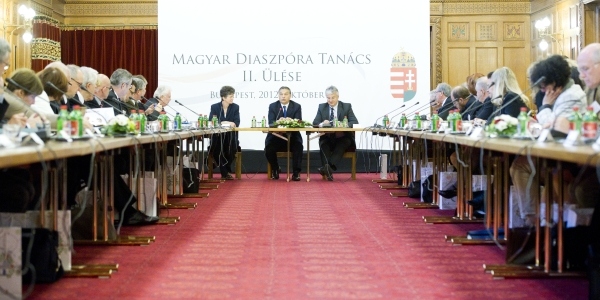
Lower state debt, higher competitiveness and political stability are the key elements of Hungary’s success
8 October 2012
At the opening of the Hungarian Diaspora Council (MDT) in Parliament today, Prime Minister Viktor Orbán expressed his optimism about Hungary’s ability to continue its efforts to reduce state debt and increase its competitiveness while retaining political stability in the next two years.
In his speech, the Prime Minister said that his government had been authorised to implement structural changes to make the country successful. These changes require modern ways of national development, the pillars of which are the reduction of state debt, increasing competitiveness, reversing population decline and rebuilding the community of Hungarians across the world.
The Prime Minister added that Hungary has a chance to continue its efforts to reduce state debt and increase its competitiveness while retaining political stability in the next two years. He also said that rather than succumbing to self-pity, Hungarians should utilise the “vital force of a deeply felt sense of loss”.
According to the Prime Minister, a chapter of European history has been closed and competitiveness cannot be guaranteed anymore with the same tools. He represents a different understanding of Europe and believes that the next era would be based on efforts to reinforce the family and on a “renaissance of nations.” Consequently, he mentioned that attacks on Hungary rooted in a different interpretation of European culture.
On the subject of Hungary's negative demographic tendencies, the Prime Minister said that “a community which is unable to maintain itself biologically is not able to support its own system either.”
Concerning Hungary's talks with the International Monetary Fund, Prime Minister Viktor Orbán said that “even though we would like to come to an agreement with the IMF, everybody agrees that Hungary would not have financing problems even without the deal.”
He added that improving the situation of the lower middle class is a major task for the Cabinet, thus it should launch family, housing and labour schemes for them as political stability could only be built on a broad middle class.
The Hungarian Diaspora Council is holding a two-day session in Budapest, to register Hungarian memorials and items of value around the world in the framework of the Julianus programme. The Council was founded in November 2011 with the aim to get adequate attention in national politics.
Text: Prime Minister’s Office, Photographer: Gergely Botár



